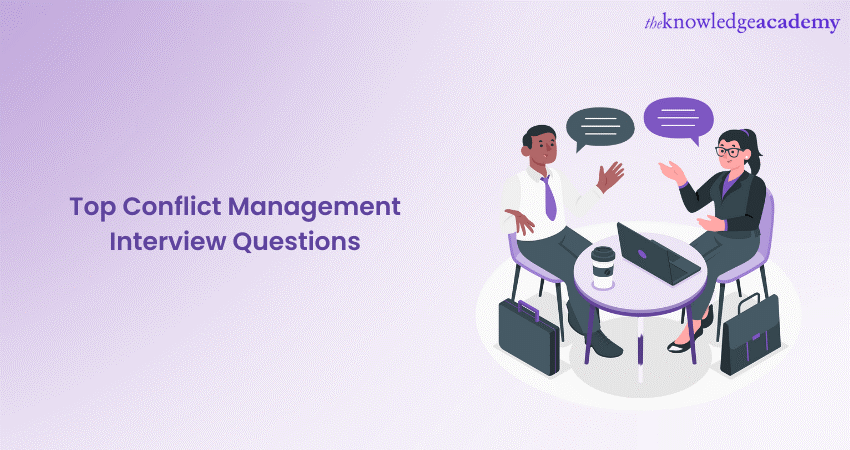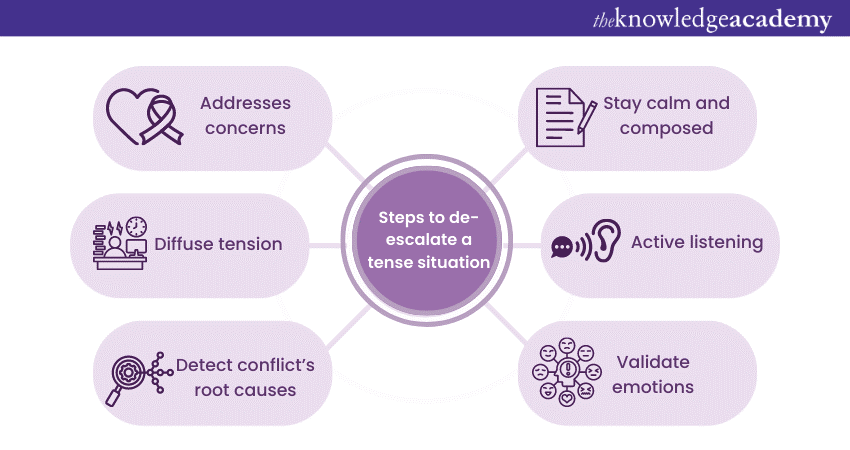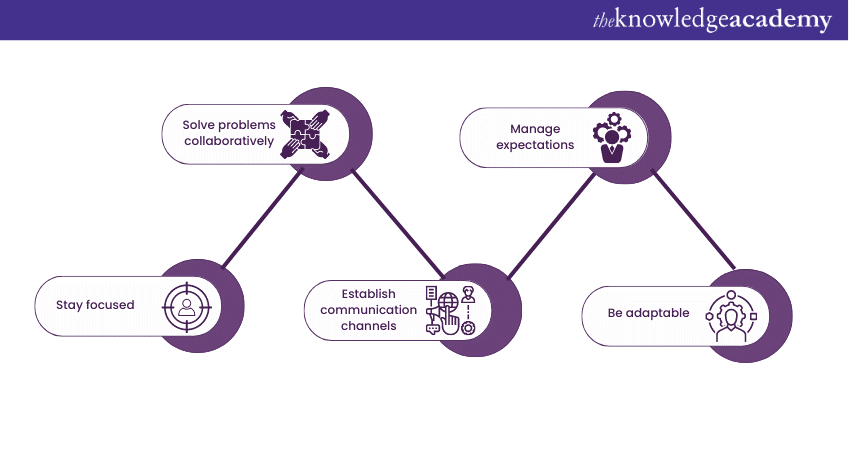We may not have the course you’re looking for. If you enquire or give us a call on 01344203999 and speak to our training experts, we may still be able to help with your training requirements.
Training Outcomes Within Your Budget!
We ensure quality, budget-alignment, and timely delivery by our expert instructors.

Conflict Management is a crucial skill required in any professional setting, and mastering it can lead to a rewarding career. Understanding the top Conflict Management Interview Questions is valuable for job seekers and Hiring Managers alike.
According to Talent.com, the average salary for a Conflicts Analyst is £37,500 annually. This could go higher based on experience and the skillset. Further, if you too are interested in building your career in this domain, read this blog to learn the top Conflict Management Interview Questions and answers.
Table of Contents
1) Key Conflict Management Interview Questions with answers
a) How do you approach conflicts in the workplace?
b) Can you provide an example of a conflict you faced in a previous job and how you resolved it?
c) What steps do you take to de-escalate a tense situation?
d) How do you prioritise finding a resolution that satisfies all parties involved in a conflict?
e) Can you describe a time when you successfully mediated a conflict between two individuals or teams?
f) How do you handle conflicts that arise due to miscommunication or misunderstandings?
g) How do you handle conflicts with superiors or authority figures?
h) Can you share a situation where you had to make a tough decision to resolve a conflict?
2) Conclusion
Key Conflict Management Interview Questions with answers
Conflict Management is a highly rewarding career path with numerous benefits. However, to succeed in this field, having a strong grasp of Conflict Management Interview Questions is crucial. Here are the interview questions for Conflict Management that will help you demonstrate your preparedness and excel in Conflict Management scenarios:
1. How do you approach conflicts in the workplace?
An ideal answer to this question would be something like - “I approach conflicts in the workplace by first understanding the perspectives of all parties involved. Then, I facilitate open and respectful communication to find common ground and mutually beneficial solutions. I prioritise collaboration and focus on maintaining positive relationships.”

2. Can you provide an example of a conflict you faced in a previous job and how you resolved it?
A suitable response to this question could be along these lines - “In a previous job, I encountered a conflict between two team members with different working styles. I organised a meeting where they could express their concerns and find areas of agreement. We developed a compromise that satisfied both parties through active listening and mediation.”
3. How do you manage conflicts between team members with different opinions or work styles?
A suitable response to this question would ideally follow along these lines - “When managing conflicts between team members, I encourage open dialogue and active listening. I aim to foster understanding and find common ground by facilitating a respectful exchange of perspectives. I promote a collaborative environment that values diverse opinions and seeks win-win solutions.”
4. What steps do you take to de-escalate a tense situation?

A perfect response to this question might be something along these lines - “In order to de-escalate a tense situation, I remain calm and composed. I actively listen to all parties involved, validate their emotions, and seek to understand the root causes of the conflict. I then work towards finding a solution that addresses their concerns and diffuses tension.”
5. How do you prioritise finding a resolution that satisfies all parties involved in a conflict?
For this question, consider framing your response in this manner - “I prioritise finding a resolution that satisfies all parties by engaging in active negotiation and compromise. I encourage open communication, seeking to understand each party's underlying needs and interests. Through creative problem-solving, I aim to find a solution that meets everyone's requirements.”
6. Can you describe a time when you successfully mediated a conflict between two individuals or teams?
This question might be best answered in the following way - “In a previous role, I mediated a conflict between two teams that had different priorities and could not collaborate effectively. By facilitating open discussions, encouraging empathy, and finding common goals, I helped them build mutual understanding and establish a productive working relationship.”
7. How do you handle conflicts that arise due to miscommunication or misunderstandings?
For this particular question, a suitable response might look something like - “When conflicts arise due to miscommunication or misunderstandings, I take proactive steps to clarify information and ensure clear communication. I encourage active listening, asking clarifying questions, and promoting transparency to resolve misconceptions. I strive to foster a culture of open and effective communication.”
8. What strategies do you employ to maintain a positive work environment, even in the midst of conflicts?
Your answer to this question could be structured as follows - “In order to maintain a positive work environment during conflicts, I emphasise the importance of respect and professionalism. I encourage open dialogue and create a safe space for team members to speak about their concerns. By focusing on constructive problem-solving and fostering a supportive culture, I help alleviate tensions and maintain a positive atmosphere.”
9. How do you handle conflicts with superiors or authority figures?
A response in line with the following would suit this question - “When handling conflicts with superiors or authority figures, I approach the situation respectfully and professionally. I express my concerns calmly and provide supporting evidence if necessary. I seek common ground, propose alternative solutions, and remain open to constructive feedback. I aim to find a resolution that aligns with the organisation's goals.”
Unlock your potential as a Conflict Management expert and transform workplace dynamics with our Conflict Management Training – Sign up now!
10. Can you share a situation where you had to make a tough decision to resolve a conflict?
Your response to this question might be best directed along these lines - “In a project I managed, I had to make a tough decision when two team members had conflicting ideas that impacted the project's progress. After careful analysis and considering the project objectives, I made a decisive call and explained the reasoning to both individuals, ultimately resolving the conflict and moving the project forward.”
11. How do you ensure open and effective communication during conflict resolution?
A possible approach to answering this question could be along these lines - “In order to ensure open and effective communication during conflict resolution, I create a safe and inclusive environment where individuals feel comfortable expressing their opinions. I actively listen, ask clarifying questions, and encourage honest dialogue. By promoting transparency and respect, I help foster productive communication and facilitate conflict resolution.”
12. What steps do you take to understand the underlying causes of a conflict?
An effective response to this question could be crafted in the following way - “In order to understand the underlying causes of a conflict, I engage in active listening and ask probing questions to uncover the root issues. I seek to understand each party's perspectives, emotions, and motivations. By exploring the context and underlying factors, I gain insight into the core causes of the conflict.”
13. Can you provide an example of a conflict you encountered that required creative problem-solving?
The best way to tackle this question might be to respond along these lines - “In a cross-functional team, there was a conflict regarding resource allocation for a high-priority project. In order to resolve it, I initiated a brainstorming session where team members proposed innovative solutions that maximised available resources. Through creative problem-solving, we identified an efficient plan that satisfied all stakeholders and ensured project success.”
Learn how to tackle challenges head-on and drive innovative solutions that make a lasting impact with our Problem-Solving Training – Sign up now!
14. How do you manage conflicts in a high-pressure or fast-paced work environment?

To address this question effectively, you might want to respond similarly to this - “In high-pressure or fast-paced work environments, I remain focused and composed. I prioritise timely communication, ensuring that concerns are addressed promptly. I encourage collaborative problem-solving and establish clear channels for conflict resolution. I navigate conflicts effectively in such environments by managing expectations, maintaining open communication, and staying adaptable.”
15. How do you approach conflicts where emotions are running high?
Your response to this question might be best directed along these lines - “When emotions are running high in conflicts, I prioritise emotional intelligence. I remain calm, validate the emotions of all parties involved, and provide a safe space for expressing feelings. I encourage taking a break if needed to regain composure. By addressing the emotions with empathy and understanding, I create an environment conducive to effective conflict resolution.”
16. Can you share a situation where you successfully turned a conflict into an opportunity for growth or positive change?
A possible approach to answering this question could be along these lines - “In a team facing a conflict regarding project direction, I facilitated a constructive discussion where team members expressed their concerns. Through active listening and collaboration, we leveraged the conflict as an opportunity to re-evaluate our approach. By embracing diverse viewpoints and incorporating valuable insights, we ultimately achieved a stronger project outcome, fostering growth and positive change.”
17. How do you address conflicts that arise due to cultural or diversity-related differences?
The best way to tackle this question might be to respond along these lines - “When addressing conflicts rooted in cultural or diversity-related differences, I approach the situation with cultural sensitivity and respect. I promote open dialogue, encourage learning from each other's perspectives, and seek common values. I aim to resolve conflicts and build inclusive environments by fostering understanding and appreciation for diversity. “
Embrace inclusivity and foster a diverse workplace culture with our Equality And Diversity Training – Sign up today!
Conclusion
We hope you read and understood the Conflict Management Interview Questions and answers. Mastering Conflict Management skills is essential for a successful career in this domain. You can create a positive work environment and achieve success by effectively addressing conflicts and demonstrating strong problem-solving abilities.
Level up your Conflict Management skills and enhance your career with comprehensive Management Training Courses – Sign up now!
Frequently Asked Questions
Upcoming Business Skills Resources Batches & Dates
Date
 Conflict Management Training
Conflict Management Training
Fri 19th Jul 2024
Fri 20th Sep 2024
Fri 1st Nov 2024







 Top Rated Course
Top Rated Course


 If you wish to make any changes to your course, please
If you wish to make any changes to your course, please


